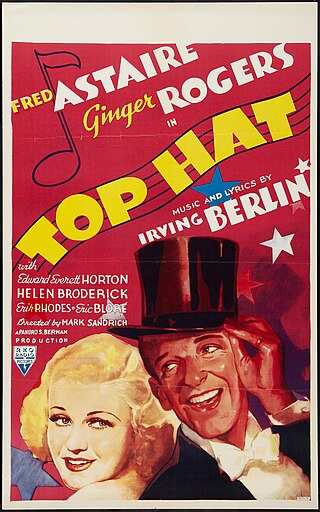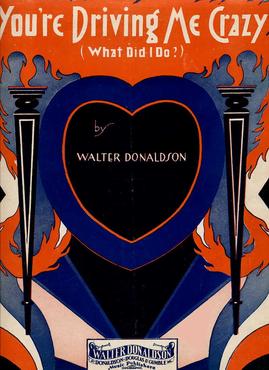Related Research Articles

Top Hat is a 1935 American musical screwball comedy film, in which Fred Astaire plays an American tap dancer named Jerry Travers, who arrives in London to star in a show produced by Horace Hardwick. He meets and attempts to impress Dale Tremont to win her affection. The film also features Eric Blore as Hardwick's valet Bates, Erik Rhodes as Alberto Beddini, a fashion designer and rival for Dale's affections, and Helen Broderick as Hardwick's long-suffering wife Madge.
"Something's Gotta Give" is a popular song with words and music by Johnny Mercer in 1954. It was published in 1955. It was written for and first performed by Fred Astaire in the 1955 musical film Daddy Long Legs, and was nominated the same year for an Academy Award for Best Original Song, losing to "Love is a Many Splendored Thing" from the film of the same name.
"All of You" is a popular song written by Cole Porter and published in 1954.
"They Can't Take That Away from Me" is a 1937 popular song with music by George Gershwin and lyrics by Ira Gershwin. It was introduced by Fred Astaire in the 1937 film Shall We Dance and gained huge success.

"Cheek to Cheek" is a song written by Irving Berlin in 1934–35, specifically for Fred Astaire, the star of his new musical, Top Hat, co-starring Ginger Rogers. In the movie, Astaire sings the song to Rogers as they dance. The song was nominated for the Best Song Oscar for 1936, which it lost to "Lullaby of Broadway". The song spent five weeks at #1 on Your Hit Parade and was named the #1 song of 1935. Astaire's 1935 recording with the Leo Reisman Orchestra was inducted into the Grammy Hall of Fame in 2000. In 2004, Astaire's version finished at No. 15 on AFI's 100 Years...100 Songs survey of top tunes in American cinema.

Three Little Words is a 1950 American musical film biography of the Tin Pan Alley songwriting partnership of Kalmar and Ruby. It stars Fred Astaire as lyricist Bert Kalmar and Red Skelton as composer Harry Ruby, along with Vera-Ellen and Arlene Dahl as their wives, with Debbie Reynolds in a small but notable role as singer Helen Kane and Gloria DeHaven as her own mother, Mrs. Carter DeHaven.

Ella Fitzgerald Sings the Irving Berlin Song Book is a 1958 studio album by the American jazz singer Ella Fitzgerald, with a studio orchestra conducted and arranged by Paul Weston, focusing on the songs of Irving Berlin. It was part of the popular and influential Songbook series.

"A Fine Romance" is a popular song composed by Jerome Kern with lyrics by Dorothy Fields, published in 1936.
"Dancing in the Dark" is a popular American song, with music by Arthur Schwartz and lyrics by Howard Dietz, that was introduced by John Barker with Tilly Losch dancing in the 1931 revue The Band Wagon. The song was first recorded by Bing Crosby on August 19, 1931 with Studio Orchestra directed by Victor Young, staying on the pop charts for six weeks, peaking at #3, and helping to make it a lasting standard.
Donald Alton Fagerquist was a small group, big band, and studio jazz trumpet player from the West Coast of the United States.
"Let's Face the Music and Dance" is a song published in 1936 by Irving Berlin for the film Follow the Fleet, where it was introduced by Fred Astaire and featured in a celebrated dance duet with Astaire and Ginger Rogers. The jazz song has also been covered by various artists years following its release, including Nat King Cole, Ella Fitzgerald, Frank Sinatra, Mel Torme, Todd Gordon and others.
"Steppin' Out with My Baby" is a popular song written by Irving Berlin and introduced in the 1948 musical film Easter Parade. There it was sung by Fred Astaire as part of a dance number involving Astaire on stairs and three different dance partners.
"Isn't This a Lovely Day?" is a popular song written by Irving Berlin for the 1935 film Top Hat, where it was introduced by Fred Astaire in the scene where his and Ginger Rogers' characters are caught in a gazebo during a rainstorm. The lyric is an example of a song which turns a bad situation into a love song, a common style for Irving Berlin, as in "I've Got My Love to Keep Me Warm" and "Let's Have Another Cup of Coffee".
"No Strings (I'm Fancy Free)" is a popular song written by Irving Berlin for the 1935 film Top Hat, where it was introduced by Fred Astaire. In the film, the character played by Astaire is advised to get married and Astaire responds by saying he prefers to remain as a bachelor and he launches into this song and a major dance routine.(Top Hat#Musical numbers and choreography)
"I Concentrate on You" is a song written by Cole Porter for the 1940 film Broadway Melody of 1940, where it was introduced by Douglas McPhail.

"You’re Driving Me Crazy" is an American popular song composed by Walter Donaldson in 1930 and recorded the same year by Lee Morse, Rudy Vallée & His Connecticut Yankees and Guy Lombardo & His Royal Canadians.
Alvin Stoller was an American jazz drummer. Though he seems to have been largely forgotten, he was held in high regard in the 1940s and 1950s. He was best known for playing drums on both Mitch Miller's recording of "The Yellow Rose of Texas" and Stan Freberg's parody of Miller's recording.

The Astaire Story is a 1952 album by Fred Astaire. The album was conceived of and produced by Norman Granz, the founder of Clef Records, who was also responsible for the Jazz at the Philharmonic concerts, at which all of the musicians on the album had performed.

Mel Tormé Sings Fred Astaire is a 1956 album by Mel Tormé, recorded in tribute to Fred Astaire. This was Tormé's second recording with Marty Paich and his Dek-Tette.
The following is the discography of American dancer and singer Fred Astaire.
References
- ↑ Whitburn, Joel (1986). Joel Whitburn's Pop Memories 1890-1954. Menomonee Falls, Wisconsin: Record Research Inc. p. 598. ISBN 0-89820-083-0.
- ↑ "The Boswell Sisters Discography". guymcafee.com. Retrieved March 30, 2020.
- ↑ "Carroll Gibbons - Top Hat, White Tie and Tails". YouTube . September 2, 2015.
- ↑ "The Astaire Story, Vol.1-2 - Fred Astaire". AllMusic . Retrieved April 15, 2024.
- ↑ "Mel Torme Sings Fred Astaire - Mel Tormé". AllMusic . Retrieved April 16, 2024.
- ↑ "Louis Armstrong – Under The Stars". Discogs . Retrieved April 16, 2024.
- ↑ "Sings the Irving Berlin Song Book - Ella Fitzgerald". AllMusic . Retrieved April 14, 2024.
- ↑ "The Complete London Sessions - Fred Astaire". AllMusic . Retrieved March 30, 2020.
- ↑ "Steppin' Out - Tony Bennett". AllMusic . Retrieved April 15, 2024.
- ↑ "Cherry Poppin' Daddies – The Boop-A-Doo". Discogs . Retrieved April 14, 2024.
- ↑ NRK 1: Med lisens til å glede, July 24, 2010.
- ↑ McKim, D. W.; Brian Henson. "Muppet Central Guides - The Muppet Show: Rudolf Nureyev" . Retrieved July 19, 2009.
- ↑ SCTV - Al Peck's Sanitone Drycleaning, July 22, 2010, archived from the original on December 21, 2021, retrieved June 14, 2021
- ↑ Carey, Jim (January 8, 2015). "Batman Forever". Youtube. Fandango/Google. Archived from the original on December 21, 2021. Retrieved March 5, 2017.